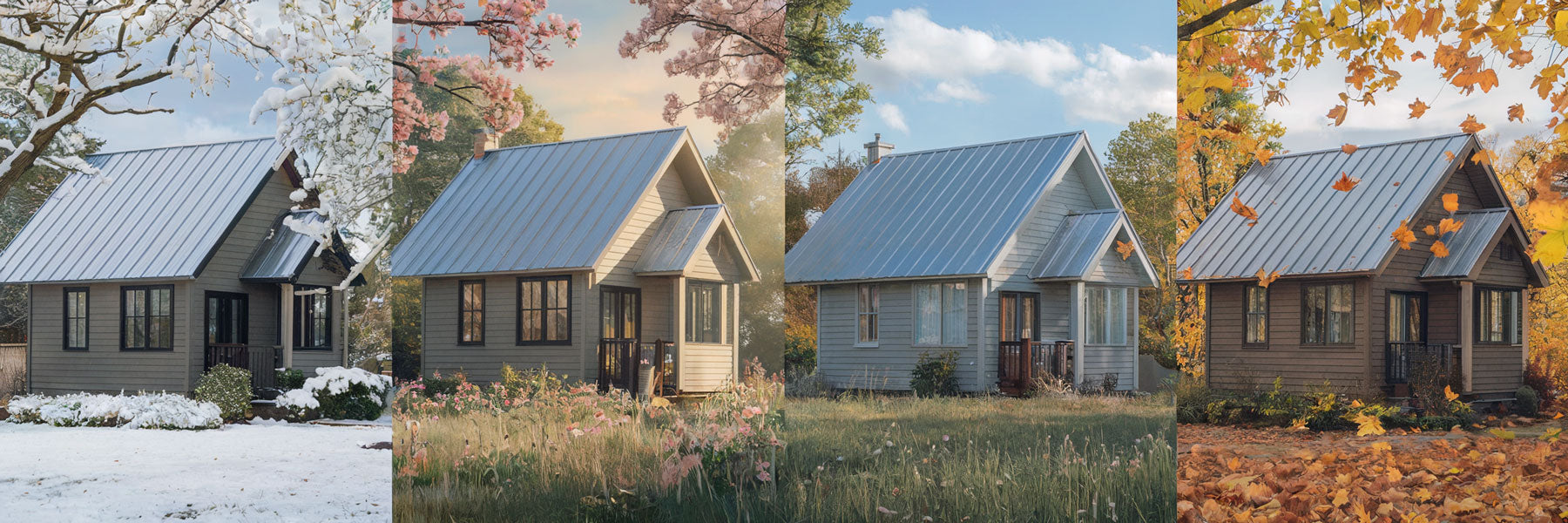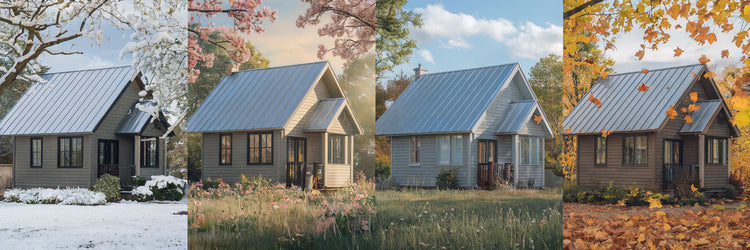How Long Does a Metal Roof Last? Unveiling the Longevity of a Metal Roof
Are you considering a metal roof for your home? One of the most compelling reasons to choose metal roofing is its exceptional lifespan. But just how long does a metal roof last?
This comprehensive guide dives deep into the factors that influence the
Understanding the Lifespan of a Metal Roof
While it's tempting to give a simple answer to "how long does a metal roof last," the truth is that several factors contribute to the life expectancy of a metal roof system. On average, a well-maintained metal roof can last anywhere from 40 to 70 years, significantly outperforming traditional asphalt shingle roofs, which typically last 15-20 years.
What Factors Influence a Metal Roof's Lifespan?
-
Type of Metal: Different metals have varying lifespans. For instance, steel and aluminum are common choices with excellent
longevity , while copper and zinc roofs can last even longer. - Quality of Materials: Investing in high-quality metal roofing materials from reputable manufacturers ensures greater durability and resistance to the elements.
- Installation Quality: Proper installation is crucial. A skilled roofing contractor will ensure correct fastening, sealing, and flashing to prevent leaks and premature wear.
- Climate and Environment: Environmental factors like extreme temperatures, heavy snowfall, coastal salt spray, and air pollution can impact a metal roof's lifespan.
- Maintenance: Regular inspections and maintenance, such as cleaning debris and checking for damage, can significantly extend the life of your metal roof.
How Long Do Different Types of Metal Roofs Last?
- Standing Seam Metal Roof: This popular type, known for its concealed fasteners and vertical panels, can easily last 50 years or more with proper care.
- Screw-Down Panel Metal Roof: While slightly less durable than standing seam, screw-down panel metal roofs still offer an impressive lifespan of 40-50 years.
-
Metal Shingles: Designed to mimic the look of traditional shingles and clay tiles, metal shingles offer comparable
longevity to standing seam roofs.
Comparing Metal Roofs to Asphalt Shingle Roofs
When considering roof replacement, it's essential to compare the lifespan of metal roofs to traditional shingle roofs. While asphalt shingles may have a lower upfront cost, their shorter lifespan means more frequent replacements, adding to long-term expenses. A metal roof, with its exceptional
Is a Metal Roof Right for You?
Choosing the right roof for your home depends on various factors, including your budget, aesthetic preferences, and the climate you live in. Metal roofs offer a compelling combination of durability,
Maximizing the Lifespan of Your Metal Roof
To ensure your metal roof lasts as long as possible, consider these essential factors:
- Choosing the Right Metal: Select a metal roofing material suitable for your climate and environmental conditions.
- Proper Installation: Hire a qualified and experienced roofing contractor specializing in metal roof installation.
- Regular Maintenance: Inspect your roof regularly, clean debris, and address any signs of damage promptly.
Metal Roof Maintenance: Keeping Your Roof in Top Shape
Proper metal roof maintenance is key to extending its lifespan. Here are some essential tips:
- Regular Inspections: Inspect your roof at least twice a year, especially after severe weather events, to identify any damage or potential issues.
- Cleaning: Remove leaves, branches, and other debris that can accumulate on the roof and cause damage or block water flow.
- Gutter Maintenance: Keep your gutters and downspouts clean and free-flowing to ensure proper drainage and prevent water damage.
- Snow Removal: In areas with heavy snowfall, consider carefully removing excess snow to prevent overloading and potential damage to the roof.
- Professional Inspections: Schedule professional inspections every few years to identify any hidden issues and ensure the roof's structural integrity.
Choosing the Right Metal Panel for Your Needs
With various metal roofing options available, selecting the right metal panel is essential for maximizing lifespan and performance. Consider factors like:
- Durability: Different metals offer varying levels of resistance to corrosion, dents, and scratches.
- Aesthetics: Choose a style and color that complements your home's architecture and your personal preferences.
- Energy Efficiency: Some metal panels come with reflective coatings that can help reduce energy costs by reflecting sunlight.
- Cost: Metal roofing materials vary in price, so consider your budget and long-term value.
Metal Roofing for Your Climate: Making the Right Choice
Different climates pose unique challenges to roofing materials. When choosing a metal roof, consider your local weather conditions:
- Coastal Regions: Aluminum or zinc roofs are excellent choices for coastal areas due to their high resistance to salt spray and corrosion.
- Areas with Heavy Snowfall: Standing seam metal roofs with their smooth surfaces are ideal for shedding snow and preventing ice dams.
- Hot Climates: Metal roofs with reflective coatings can help keep your home cooler and reduce energy consumption.
Common Metal Roofing Myths Debunked
- Myth: Metal roofs attract lightning.
- Fact: Metal roofs are no more likely to attract lightning than other roofing materials. They are actually safer because they are non-combustible.
- Myth: Metal roofs are noisy during rain.
- Fact: Properly installed metal roofs with solid sheathing and insulation minimize noise from rain or hail.
- Myth: Metal roofs are too expensive.
-
Fact: While the initial cost of a metal roof may be higher than an asphalt roof, its
longevity and lower maintenance costs make it a cost-effective investment in the long run.
Key Takeaways: The Longevity of Metal Roofs
- Metal roofs offer exceptional lifespan, lasting 40-70 years or more.
- Factors like metal type, installation quality, and maintenance will affect metal roof lifespan.
- Standing seam metal roofs are known for their long lifespan and durability.
- Proper maintenance is crucial for maximizing the life of your metal roof.
- Choose the right metal roof panel and consider your climate for optimal performance.
By understanding the factors that influence a metal roof's lifespan and investing in proper installation and maintenance, you can enjoy a durable, long-lasting roof that protects your home for generations to come.

